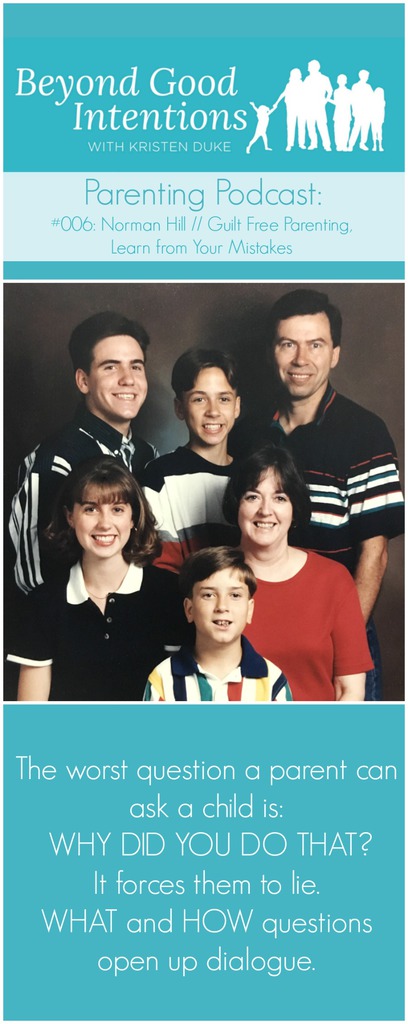I’m delighted to share my dad in this episode talk about guilt free parenting, and learning from your mistakes. From the beginning, I wanted Beyond Good Intentions to be a PARENTING podcast, not just for and about motherhood, but parenting suggestions for both mothers and fathers. I knew I wanted to have men as guests, even though most of my interaction has been through mothers, and who I feel most comfortable interviewing.
But men…FATHERS, I believe are a very integral part of raising children, and their perspective is very important to me as well. I’ve been in contact with a handful of men with hopes to interview in the future, but I also knew I wanted to have my dad early on because he is amazing in my eyes. He took his role as father very seriously, and I’m delighted to share HIM with YOU today. When you make it to the very end of this interview, and hear about the 50 year Harvard Study, you will know why he felt so reinforced in his role.
I feel like this is our first EXPERT, because truly my dad is a SCHOLAR OF LIFE. You’ll hear him quote books and studies, this is the REAL DEAL my friends, it’s truly my dad, off-the-cuff. It’s all information just swimming around in his brain, no google searches, no notes to prepare him, he didn’t know what I would be asking!
My dad has always been my hero. As a little girl, teenager, and even as an adult my dad is someone I have looked to for advice and know he’ll have a great answer. You will learn from our conversation why… he is a wealth of information.
I learned a few things for the first time in this chat. One is how he decided at a young age that HE WANTED to be a good dad, partly from observing how one family was an example to him of connected-ness and what they did.
A lot of his parenting ideals stems from his desire to learn, to read, and to be better. This example has been my inspiration throughout my life, and I love how at one point he shares a not so positive parenting example, and the guilt that followed, but that how over time he learned he didn’t have to be perfect, but to be striving to always better himself as a parent and learn from his mistakes. One of my favorite lessons from him in my early parenting days is why we should never ask our kids rhetorical questions, you’ll hear this explained as well.
Not only do we discuss his growing up in a small town and how he was disciplined according to the “spare the rod spoil the child” viewpoint, but also how he wanted to do things differently with his kids. We go from there to talking about teens dating, helping your child realize their potential if it’s not academics (hint: that’s me!), and biting your tongue in grandparent-hood with alternative suggestions to “telling your kids how to raise their kids.”
We conclude with our discussion on how he strived to fulfill my mom’s role as grandma when she passed away, and how he felt losing his spouse of 40 years. To see links to more information about that, see the show notes.
*****If you want to learn more about my mom’s passing, my thoughts, my dads thoughts, and the aftermath, I first wrote about it in Families can be Together Forever, and at the bottom of that post, share links to more posts.
Since our interview spanned so much time (60+ years of his life), and I didn’t want to hold back on asking questions, I decided to split this into part A and part B so as to not overwhelm you! Lots more info in the show notes on my site. At the beginning of our chat, we were doing a quick sound check, and I asked him to say something, and instead she sang a line of one of his favorite children’s songs, Give Said the Little Stream, which I think is the perfect intro to him. My dad is the best combination of thoughtful, smart, silly, with just a little quirky thrown in. Without further delay, here is my DAD!
You can listen to both parts of the interview right here from my site, just push play! {Warning, 1 hour each part!)
To hear more interviews from other parents, head to the Beyond Good Intentions section of my website.

—————–
Here are some of my favorite quotes from our conversation:
“I remember thinking, there has to be a better way than just kicking or whacking your child for punishment.”
“A lot of people say today that yelling is the new spanking.”
“We didn’t subscribe to any one theory of parenting, but found ways that worked for us through trial and error.”
“The part of time-out that is under-emphasized and under-utilized, that when you are through, you have to talk about it, don’t miss out on that teaching moment.”
“I’ve occasionally heard parenting advice say to be consistant, but I don’t think anybody can be 100% consistant and I think it puts undue pressure on parents and creates guilt feelings when we are inconsistent.”
“Continue to do your best. Keep looking at situations and ask, How can I do this better? I know where I want to go in parenting, how do I get there? It’s going to be some trial and error and inconsistency and that’s ok. If we give ourselves a little more credit for doing our best and a little less guilt when we lose it.”
“Children can become addicted to praise in the same way they become addicted to television or other. Praise can be seen as…”if I don’t get a lot of external stimulus from others, I must not have done very well.” The best kind of praise is for a child to debrief their own experience and you can facilitate that by asking, “how does that make you feel?” Help them come up with the answer to: What can I do to achieve my goals better or improve. Praise should come from encouraging a child internally, they turn the key, they should look at what they did and how they did it, with external facilitation. Don’t say, “don’t feel bad.” Ask them how they feel and what they can do differently, for good or for bad experiences. Change the motivation from external to internal.
“Make a point to have your home a gathering place. Stock it with snacks the teenagers will love.”
“Establish dialogue so kids can express equality. WHAT and HOW questions open up dialogue with your kids, not WHY (rhetorical) questions, they can’t answer that, so they learn to lie. The worst question a parent can ask a child is WHY DID YOU DO THAT? It forces them to lie.” Sample: “What did you do? How do you think that affects our family, how are you going to rectify the situation.” As the parent, own your own feelings, and tell them why you are upset.
“Anytime you ask a rhetorical question, it’s a power dynamic. It’s a way of saying, “I have the answer lets see if you can guess it.”
“In parenting, especially in conversation, you want to establish equality so a child can feel they can express themselves freely. “WHY” limits discussion, rather than allowing it.”
“It doesn’t matter where you live but HOW.”
“Make your home a gathering place, and as they become teenagers, keep your fridge and your pantry well stocked.”
Books Mentioned:
- How to Make your child a winner
- Gifts Differing: Understanding Personality Type
- Frames of the Mind: 8 different types of intelligence (we discussed this about academic learning vs. others)
- The Plug in Drug: Turn off the TV
- Adaptation to Life: Harvard 50 Year Study on Parenting–1. Fathers involvement makes a difference 2. Enjoy Your Kids
- Creating Closer Families: Principles of Positive Family Interaction
A few other things mentioned:
- Family Home Evening–family discussion/game time every Monday night
- Early Morning Seminary–Bible/scripture study for teenagers before high school (6am)
- LDS/Latter-day Saint/Mormon Who are Mormons?





